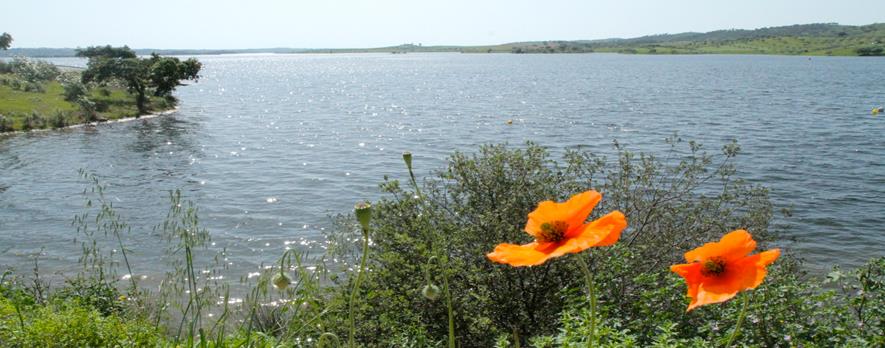
Grande Lago ‘Albufeira de Alqueva’, proclaimed as the largest artificial lake in Europe, is located in the Alentejo region and covers an area of approximately 250 km2. It is refurbished with the latest and most sophisticated technology and, of a capacity for 4 years with an inactive stream of water and no rainfall, it was built primarily to serve as a reservoir for the relatively dry lands of Alentejo, as well as for the provision of hydroelectric energy and promotion of eco-tourism.
The lake was formed with the construction of the dam and completely transformed the traditional landscape, enriching the surrounding in sceneries and altering its natural biodiversity. It also accelerated the economy by increasing the financial income as the new tourist destination attracted a larger quantity of visitors per year with an approximately equal percentage (50%- 50%) of foreigners and natives, as well as agricultural activities derived from the constant supply of water accessible for irrigation. Furthermore, Amieira Marina attempts to reduce human-induced pollution and maintain sustainability through the introduction of 15 House Boats, all hydroelectrically powered.
In contrast, some environmentalist argue that this statement is controversial as sustainability encompasses “how biological systems endure and remain diverse and productive” and no statistical data was provided to support that biological diversity in the region has been promoted. In support of this argument, several locals and Federal representatives shared that a number of species such as cranes, Aves members, wild boars and a variety of shrubs, that were originally common to the ecosystem, have completely disappeared since the building of the Alqueva Dam due to the loss of their natural habitats. Moreover, the ichtyofauna has been drastically affected as many new aquatic predators have evolved.
In reply to this, an Edia (Alqueva Development and Infra-structures Company) representative stated that he strongly believes that the newly evolved habitats and organisms compensate and even embellish the variety of the original ecosystem. Additionally, owners rearing mammals such as rabbits or bats, who were forced to move to another terrain as the village situated in the area were the dam was built had to be relocated, were reimbursed financially and the animals compensated for the loss of shelter by provision of a new, artificial replicas.
One of the owners affected, however, protested and suggested that the new habitats provided lacked essential attributes characteristic to the former, such as the range of space available, thus causing discomfort for the animals and consequently a reduction in the overall population. The interviewee also added that the financial compensation barely covered the costs of the fences and land in hectares, but did not consider the income deficit due to loss of terrain and stock. Not to mention the misfortunate loss of heritage and historical monuments, abandonment of cherished memories passed on from generation to generation and “forfeiture of the ancient soul of the village”, as well as meteorological changes – particularly the highly condensed humidity and severe climate changes in terms of thermal amplitude.
On consultation with tourists visiting the area, we discovered that there certainly is a variety in opinions, logistic rationalizations and attitudes towards the subject. Some verified that the preferences of the majority should be prioritized over those of the minority and even over the integrity of the ecosystem in an area. Others expressed genuine concern and said they sincerely believed that there were less harmful and more efficient ways to achieve the final goal. Each explanation included theoretical, as well as practical explanations justifying the answer given and some included phrases such as “political games”, “water pollution is a very serious issue”, “synchronization of Spanish and Portuguese laws regarding the usage of the lake” and “the project is not completed yet – we are currently at a much lower level than the project could be taken to”.
Regardless of whether the individual was against the construction of Alqueva Dam and subsequently, Grande Lago or supported it, everyone interviewed admitted the presence of negative and positive aspects to the mission. While it is true that every cloud has a silver lining, it often takes an ample amount of time to overcome the damages caused by the storm, which sadly can sometimes also be irreversible.

Grupo 1: Chrystala Kyriacou, Angelina Dimitrova, Tomas De Backer, Mafalda Gomes.



You must be logged in to post a comment.